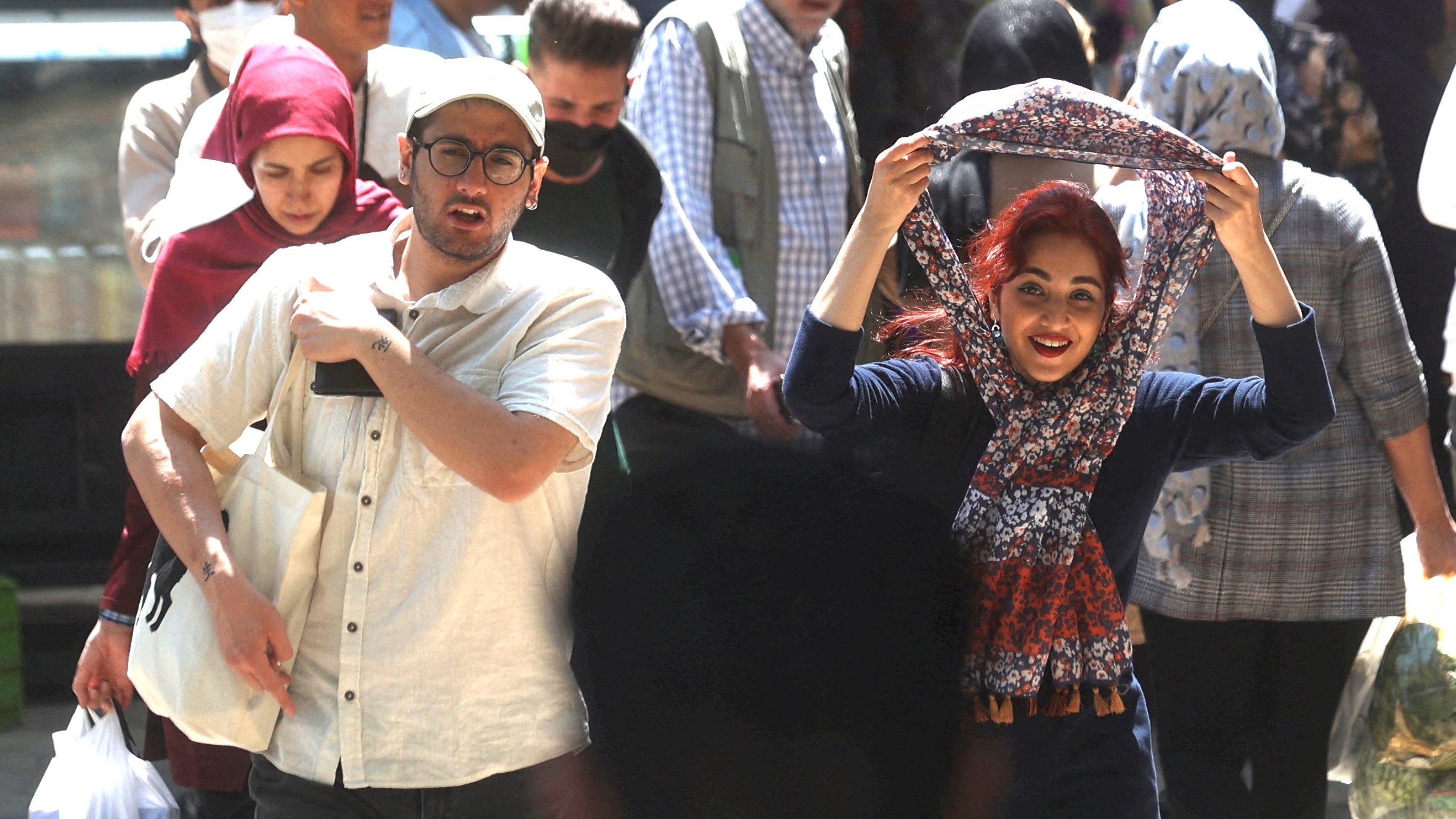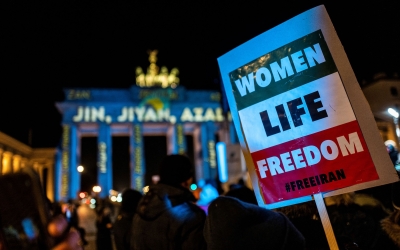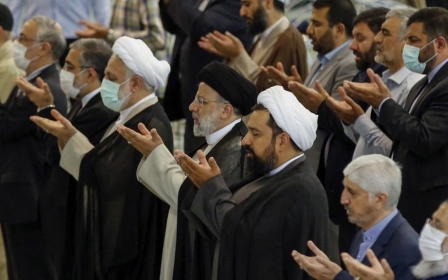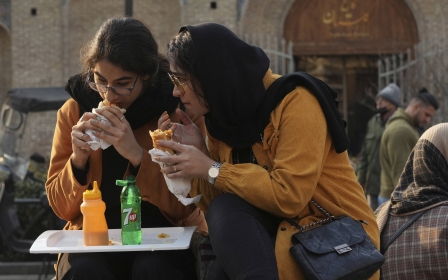Iranian women taunt hardline police chief over latest attempt at hijab enforcement

The Iranian police's latest attempt to enforce the country's strict dress code, by using traffic cameras to identify unveiled women, has already provoked a backlash in a society where not wearing the hijab is becoming increasingly common.
Earlier in April, police began monitoring traffic cameras to identify women who are not wearing the hijab, as part of their implementation of the so-called "national chastity and hijab plan".
Those who are caught for the first time are sent a "warning text message as to the consequences" of their actions. On the second offence, their vehicles would be confiscated and they would face a lawsuit.
However, with an economic crisis still gripping the country, and with more women refusing to wear headscarves in public since 2022's anti-government protests, many in Iran find the government's concern with women's clothing infuriating.
Morteza, a taxi driver in his mid-30s, told Middle East Eye that he stood squarely opposed to the dress code enforcement in Iran.
"I have received a warning message from the police too. But I won't listen to such bullshit," he said.
"I care about the hijab, but I have no right to force women [to wear it]."
'They think that we would retreat and ignore all the sacrifices that have been made in the past few months for women's liberty'
- Somayeh
To protect the privacy of his unveiled female passengers, Morteza said he planned to install sunshades for his car window so the camera wouldn't be able to identify them.
The surveillance goes beyond the monitoring of cars, also tracking women's dress code in public places, including in shopping malls and on streets in general. The police urges business owners to "seriously monitor the observance of societal norms with their diligent inspections".
In his first statement since the launch of the new measurements, police spokesperson Saeed Montazerolmahdi said that unveiled women "seem to have come from another planet" and are "ignorant of the customs and norms" of Iran.
He added that in the first 24 hours after the implementation of the plan, the police sent a few hundred warning texts to female drivers and over 3,500 warning texts to store owners.
Moreover, the police have also been sending millions of text messages to people reminding them to respect the hijab law, he said.
Women's long-haul fight
Many Iranian women have been taking off their veils and publicly posting about it online since the death of 22-year-old Mahsa Amini in police custody last year, after she was arrested for allegedly wearing her hijab "inappropriately".
Iran's recent attempts to enforce compulsory hijab have sparked a fresh wave of defiance among young women. Some have even taken to social media to mock the police chief, Ahmad Reza Radan, who developed a reputation for brutality against protesters and takes a hard line on "deviant" fashion styles.
By posting pictures of themselves with the caption "Where are you Radan?" women have drawn attention to what they see as the absurdity of the government's crackdown.
In another act of defiance against the compulsory hijab, a woman recently ran an endurance race around the city of Isfahan, the birthplace of Radan, in a sleeveless top and shorts, without a hijab.
Somayeh, a 29-year-old working at a start-up company, told MEE that women were not intimidated by Radan's threats.
"They think that we would retreat and ignore all the sacrifices that have been made in the past few months for women's liberty," she said.
"When I went out yesterday without a hijab, I saw many women just like myself all around the city. This means people weren't intimidated by Radan's threats, and he can't do a damn thing."
Overbearing police tactic
Many citizens find the police's tactics overbearing and over-the-top. The traffic cameras' lack of accuracy has also been mocked by both men and women.
Mohammad Ali Abtahi, a reformist cleric, openly questioned the intelligence of the camera devices.
"I received a text message reminding me of hijab! I was alone in the car! [The traffic cameras] are so smart that they consider the robe and turban as hijab," tweeted Abtahi, a former vice president under Mohammad Khatami.
Doubts remain about the effectiveness of the police's plan to enforce the dress code through traffic cameras.
Back in 2021 a senior police official stated that there were about 4,500 cameras in just seven cities in Iran recording violations, while 49 percent of the devices were defective and not working.
Tattered economy
At the same time, ordinary citizens weighed down by economic hardship are growing increasingly frustrated with the government's "misplaced priorities".
The Iranian economy has been badly hit in recent months as Washington has tightened its sanctions against Tehran in response to the crackdown and the likely failure of Iran-US talks meant to revive the 2015 nuclear deal.
'I don't care at all about all these threats and hijab. I just want to make my ends meet and have the ability to settle my debts'
- Reza, home appliance seller
As of February, the rial had lost 58 percent of its value in six months. While the rial traded at about 29,000 tomans against the US dollar in September, it had now exceeded 46,000 tomans (one toman is the equivalent of 10 rials).
Reza, a home appliance seller, expressed his concerns to MEE:
"I don't care at all about all these threats and hijab. I just want to make ends meet and have the ability to settle my debts," he said.
"It is shocking to see people are getting destroyed for the terrible economic situation, but all the stupid government cares about is the scarf on the head of women.”
The police faced another significant setback earlier this week when actress Pantea Bahram attended the premier screening of the final episode of "Lion's Skin" without wearing a hijab, surrounded by many young fans. The following day, the cinema theatre's manager was dismissed by the Culture Ministry.
In Iran, the decision not to wear the hijab has become a symbol of resistance and defiance against the Islamic Republic's dress code.
Symbol of defiance
Many young women are now walking in the streets and public places without wearing headscarves, a sight that has become more common as the weather becomes warmer. With the arrival of spring, a large number of women are not wearing the hijab, which has made conservatives increasingly worried.
Their supporters have been holding gatherings in front of government buildings and urging the establishment to deal with the situation.
Denying service at airports has been one part of a series of punishments laid down as part of a plan prepared by the conservative-dominated parliament to deal with women who do not abide by the hijab law. Other punishments outlined in the plan include the revocation of driver's licences and passports.
In early April, the Ministry of Education and the Ministry of Science, Research and Technology warned on the first day of the reopening of schools and universities that students who do not observe the hijab would be denied "educational services".
The plan has been met with a backlash on social networks, with many warning of the repercussions of such moves.
This article is available in French on Middle East Eye French edition.
Middle East Eye propose une couverture et une analyse indépendantes et incomparables du Moyen-Orient, de l’Afrique du Nord et d’autres régions du monde. Pour en savoir plus sur la reprise de ce contenu et les frais qui s’appliquent, veuillez remplir ce formulaire [en anglais]. Pour en savoir plus sur MEE, cliquez ici [en anglais].





